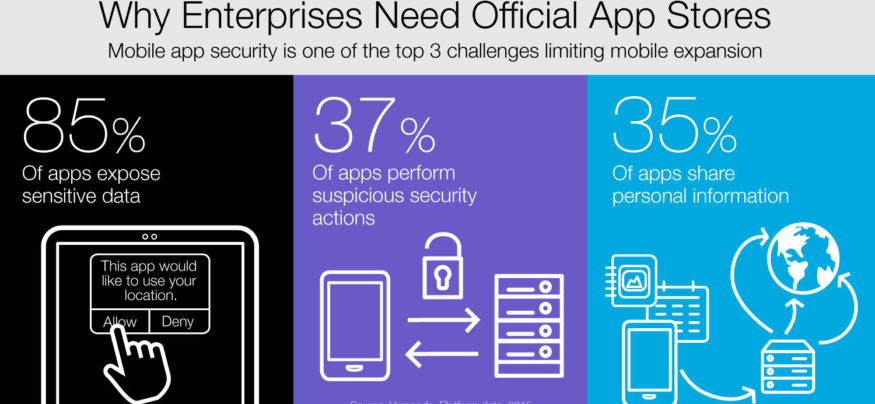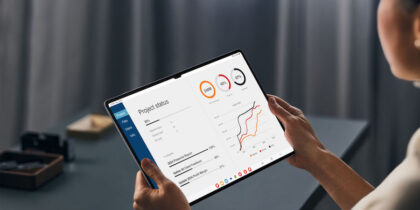Mobile app stores first appeared in 2008. Since then, a variety of app marketplaces have sprung up, providing app descriptions, reviews, and various paid and free download options. It is estimated that there are now approximately 3.7 million apps available on the major app stores, according to Statista. Applications contained in these official stores are reviewed for quality and vetted for security. But when it comes to use in the enterprise, app safety remains a major concern.
App security was cited as one of the top five challenges limiting mobile expansion for enterprise use. A 2015 report from Veracode shows that vulnerability is a real worry; the average global enterprise has some 2,400 unsafe mobile apps installed in its environment. While many of these programs are for personal use, they are often downloaded onto devices that connect to enterprise applications and services. This is a problem especially when employees bring their own devices into the workplace because organizations often have less control. Primary security issues include embedded spyware, adware and back doors, all of which can expose sensitive information. Up to 3 percent of apps from the two most popular app stores are reported to have vulnerabilities. In order to ensure that employees only use safe applications, businesses should consider deploying their own official store from which employees can select sanctioned and approved apps.
Enterprise App Stores Provide Vetted Software and Track Downloads
Gartner predicts that 25 percent of all enterprises will implement their own official app stores by 2017. Their research states that company app marketplaces will not only help organizations to better control software expenditures and create greater negotiating leverage with app vendors, but will also shield organizations from malicious applications and vulnerabilities. Enterprise app stores can take many forms. Some vendors provide marketplaces that contain free apps for employees to download. Alternatively, employers can offer vouchers and redeemable codes for paid apps. In this way, organizations will be able to track who has downloaded paid apps and keep a handle on costs. Some companies may wish to host their own app stores with links to vetted, publicly available apps and services. These can also be a central access point for apps that the organization has developed or customized itself.
Stores that provide self-service provisioning will aid in employee productivity because users can easily access resources when they need them. Additionally, organizations can improve security and manageability by providing vetted apps and manage who is accessing what through centralized reporting.
MDM and Containerization Boost Organizational Security
Although official app stores provide many security benefits, they are not a catch-all solution. Employees bringing their own mobile devices will still inevitably download external apps for personal use. Mobile device management (MDM) and containerization, like that found in Samsung KNOX, provide an added layer of security that safeguards sensitive corporate information. All devices and users within an enterprise should be required to register with the MDM system. This solution will check that the device has the required security measures in place before allowing it onto the network. If malicious apps are installed, the system will block the device from accessing sensitive data and spreading malware. Further, containerization technology provides separate compartments for sensitive corporate data and personal data, allowing user privacy when at work and information security when at home. If a device is lost or stolen, it can be selectively wiped to ensure that confidential information does not fall into the wrong hands. This technology can also ensure that personal apps cannot access corporate data.
An effective mobile strategy will incorporate all three elements described here: the use of enterprise app stores, MDM and containerization. Official app stores will benefit both users and the organization by vetting applications for security issues, while MDM and containerization safeguard sensitive corporate data at the device level. With these controls in place, organizations will be able to fully realize the benefits of fully embracing enterprise-wide mobility.
Are you ready to create an enterprise app store for your business? Samsung Business Services can give you the support you need, from application development to strategy implementation.





